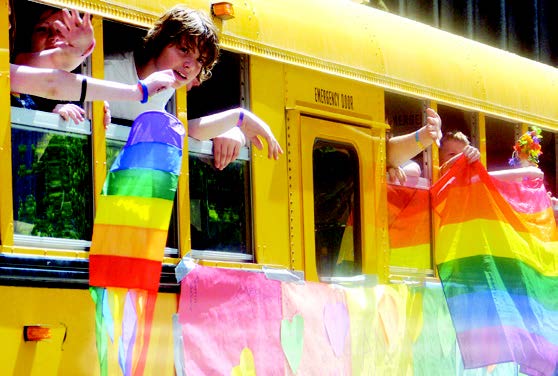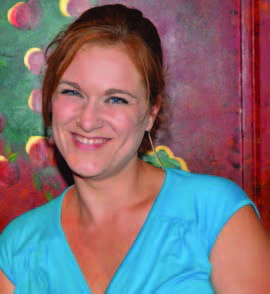 Teacher Lyndsey Schlax of the Ruth Asawa San Francisco School of the Arts is teaching the nation’s first on-site high school LGBT course, according to district officials. In this column, students from her class will be anonymously sharing with the San Francisco Bay Times their thoughts about related matters, and what they are learning in the groundbreaking course, “LGBTQ Studies.”
Teacher Lyndsey Schlax of the Ruth Asawa San Francisco School of the Arts is teaching the nation’s first on-site high school LGBT course, according to district officials. In this column, students from her class will be anonymously sharing with the San Francisco Bay Times their thoughts about related matters, and what they are learning in the groundbreaking course, “LGBTQ Studies.”
Student- 12th Grade
In their most recently premiered film, Freeheld, Ellen Page and Julianne Moore delivered a simply touching performance that was based on a true story about a civil rights case. Moore portrayed late Ocean County police lieutenant, Laurel Hester. Page played Hester’s spouse, Stacie Andree. Hester was a 23-year veteran of the Ocean County police force and had earned much respect for her work on numerous cases. Although Hester was a lesbian, she kept her personal life a secret as she felt that her sexuality would interfere with how her co-workers perceived her.
Hester discovered very quickly that she was a lesbian, but because being gay was not celebrated or openly accepted, she kept this information private. Same-sex marriage had not been legalized, yet so many members of the LGBTQ community did not feel comfortable coming out, as they feared they might be harassed or lose their jobs because of their sexuality
Hester demanded the respect she deserved from all around her, and her professionalism got her extremely far in her career in law enforcement. In 2000, Hester met her future partner and wife, Stacie Andree, who was 19 years younger than Hester. They travelled outside of New Jersey to officiate their domestic partnership and lived their lives as a normal, happy couple. Unexpectedly to her, though clearly foreshadowed in the film, Hester was diagnosed with terminal lung cancer in 2004, and was told that she only had a short time to survive.
Using her time sparingly, Hester re-quested that her pension benefits be left to her domestic partner of 5 years, Stacie. Her request was shortly thereafter denied. New Jersey counties had the option of granting extended pension benefits, but the Ocean County Freeholders did not recognize the legitimacy of the couple’s union. After the state’s LGBT civil rights organization joined forces to fight for Hester, the case became more apparent to the Freeholders that their decisions might have been unjust. After multiple appeals and much advocacy for Hester’s pension, the Freeholders reversed their decision and met on January 25, 2006, to extend pension benefits to registered domestic partners.
I was moved by Hester’s plea for her civil rights. In her fight for equal rights and protection, the lieutenant re-mained grounded and honest. All that she wanted was equal treatment, nothing more. Moore delivered an effective performance that made me believe in her cause. The chemistry of the two actors was extremely apparent in their roles, and because of this authenticity, this film was able to cover an aspect of lesbians in film differently as compared to the stereotypical, oversexualized perceptions usually found in media.
This story brought to my attention the need for social justice surrounding the LGBTQ community. One question came to mind: why do people have to fight so hard for the rights they are already guaranteed? Even after the equal protection clause of the Constitution was created when the 14th Amendment was ratified, people still try to argue that their rights are more important than those of minorities or those who do not conform to a binary construct of society. Who is to say that you are more equal than the person standing next to you? I believe that Laurel Hester’s fight for equal treatment was an incredible step for the gay community, but the last question I have to ask is: who decides whose opinion is right, and how can we further equal protection in society?
Student- 12th Grade
On the evening of October 7, 2015, many students of Ruth Asawa San Francisco School of the Arts were invited to attend the premiere of Freeheld at the historic Castro Theatre. This invitation was extended to students such as myself, due to our involvement in the first LGBTQ Studies course offered in San Francisco Public Schools. This film went along with the key theme of the class, which was the recognition of LGBTQ struggles and success in history.
The main roles of the movie were played by two very influential actors: Julianne Moore, who besides acting, has taken on the role of an activist; and Ellen Page, herself a representative of the LGBTQ community and an activist. The film opens with a police officer succeeding in a huge drug bust. By starting the film in this manner, it shows the portrayal of the character, Laurel Hester, as a successful police officer, respected and seen by her peers as one of them, rather than defined by her sexual orientation. It is later revealed that she is romantically interested in women.
Her interests are not played out as if they were out of the ordinary, because they should not be portrayed any differently from that of an heterosexual person. Just as Julianne Moore’s character, Laurel Hester, is always smoking a cigarette, which subtly foreshadows the later unfortunate diagnosis, the film’s treatment of her sexuality foreshadows the support she will later gain.
The director, Peter Sollett, in each scene thoughtfully uses every opportunity given for character development. Even in the first date between the two characters, we learn how they react to new situations. Laurel Hester clearly shows her strong need for control, and her reactions to situations when she feels a loss of control. She begins to let go of control when she falls for Ellen Page’s character, Stacie Andree, showing her eternal love for her partner. The actions that follow this turning point of the film are no longer based on her own personal interests. It is not for Laurel Hester’s own interests that she fights for the right of her pension; it is all done for her partner.
Not only is this a great representation of a healthy lesbian relationship, but it is also the reenactment of a historical event. By seeing both perspectives, the injustice of the ruling is brought to light. No one should have to struggle for their given rights in such a time of loss. The audience has a chance to grow in their understanding of struggles of hidden communities.
This film was very touching to me because of my own sexual orientation. It is rare that I see representation of healthy lesbian relationships in the media. Although it gave me much strength, it also showed how it is my responsibility to stand up for my own rights in order to help my community. I do feel scared of who I am from time to time, because it is a terrifying concept to identify as someone who is looked down upon in many places, misrepresented in the media and seemingly unrecognized. Freeheld brought much hope, as well as a warning of injustice.
For more information about the Ruth Asawa San Francisco School of the Arts, please visit http://www.sfsota.org/
 Lyndsey Schlax has been a teacher in the San Francisco Unified School District since 2008. She is uniquely qualified to address multiple areas of LGBT studies, having also specialized in subjects such as Modern World History, Government, Economics and U.S. Politics. She is a National Board Certified Teacher, and earned her M.A. in Teaching at the University of San Francisco.
Lyndsey Schlax has been a teacher in the San Francisco Unified School District since 2008. She is uniquely qualified to address multiple areas of LGBT studies, having also specialized in subjects such as Modern World History, Government, Economics and U.S. Politics. She is a National Board Certified Teacher, and earned her M.A. in Teaching at the University of San Francisco.
Recent Comments